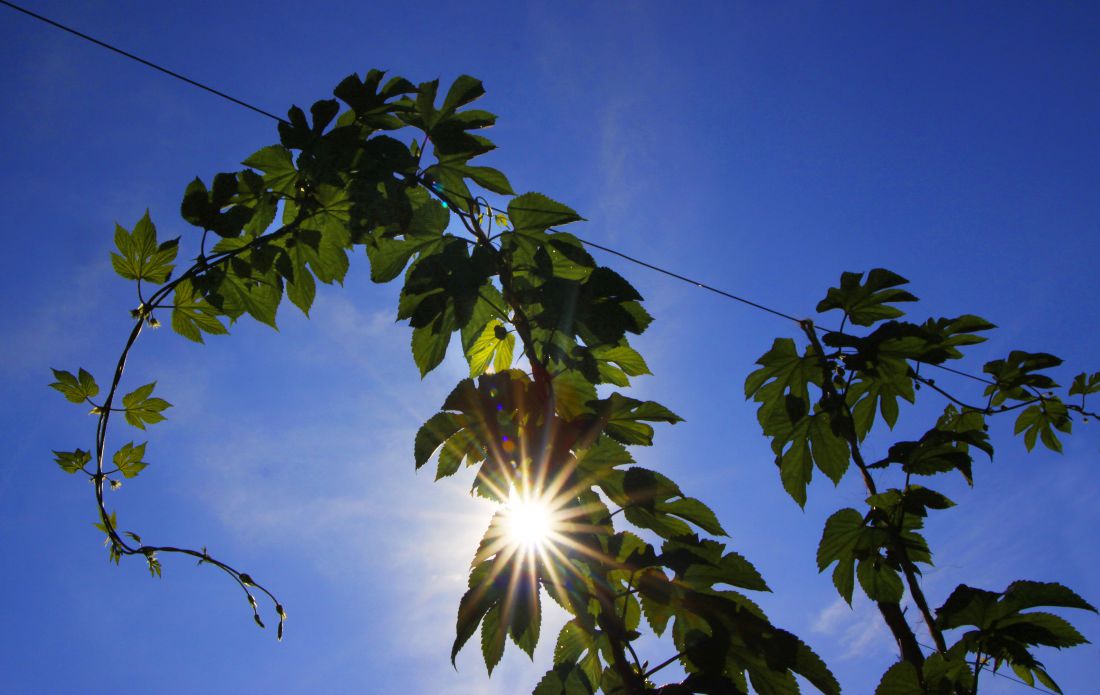At their original brewery in Chico, Calif., Sierra Nevada grows barley and hops. It’s on such a small scale that the brewery could never switch over to using only what it grows; it uses the crops instead for limited-edition estate ales.
Until recently, brewing a beer the same way — sourcing ingredients from a single local farm — was not possible for Western North Carolina brewers. Hops and barley are both relatively new to a state known better for other crops. “What I bought was an old tobacco farm,” says Julie Jensen, who purchased the 125 acres near Weaverville that became Echoview in 2005. “But I didn’t want to grow tobacco, so I looked around for other things that made sense for the area.”
Jensen quickly diversified Echoview beyond crops, and the farm became home to fiber animals like Angora goats, Angora rabbits and alpacas, as well as 20 beehives. About a half-mile away, Jensen built Echoview Fiber Mill, which is now the first Gold LEED certified manufacturing mill in the United States. But that’s not the side of the farm that ties into Echoview Farm Estate Ale.
Beer as Agriculture
Out of the four core ingredients used to make beer — malt, hops, yeast and water — the first two must be grown and harvested. So when Jensen looked at what Echoview could plant, she quickly identified hops as a candidate. “They’re such a difficult crop in this area,” says Jensen. “But beer here is huge, and so I started growing them about seven years ago.” The farm now has about 2,000 hops plants and focuses on Cascade, Nugget and Chinook varieties.
While Jensen says that Cascade is the hops that started the craft beer craze, thanks in large part to Sierra Nevada Pale Ale, she also says that Cascade hops grown in Appalachia taste different than their West Coast counterparts. “We match the alpha acid levels [the primary acid that affects the hops’ ability to impart bitterness to beer] of the west coast hops, but we have our own terroir,” says Jensen. “Our hops have a more melony taste than west coast hops, and a fruitier taste than those grown in Vermont.”
The barley, on the other hand, is a newer addition to Echoview. Jensen says the first year, 2013, did not have much of a yield due to the wet weather. However, this year her 2 acres produced enough to malt for use in beer. She grows a variety called Thoroughbred, which is a six-row barley developed by N.C. State University specifically for brewing. Jensen says the flavor of her malt is not much different, but growing it is important because it reduces the carbon footprint of making a beer.
From Barley to Beer
Riverbend Malt House took it from there, floor-malting the barley just a little darker than pilsner malt and preparing it for brewing. Actually, Riverbend did more than that: Brent Manning, one of the company’s owners, actually helped brew the beer at Fonta Flora in Morganton.
Fonta Flora’s mission statement made the brewery a natural match for Western Carolina’s first estate ale according to Jensen, since brewer Todd Boera already tries to integrate local agriculture into most of his recipes.
“We try to stay true to [beer’s] agricultural roots,” says Boera. “I’d say right now 80-85 percent of our beers are focused on local ingredients. … This project takes what we’ve already been doing to the next level.”
Boera says that brewing the first Appalachian Grown Certified beer is a big deal for Fonta Flora, and something they’d like to do more of in the future.
As for the brewing itself, “It was a cool challenge,” says Boera. “We’d never used this particular malt before and Riverbend did a nice job with it. I just used kettle caramelization to bring out a little bit more of the flavor, but the rest of the flavor is all the ingredients.”
In addition to the local malt and hops, the Belgian tripel style ale also features blackberry honey and lemon balm from Echoview. Boera says to expect notes of fresh-baled hay and a subtle honey character with some additional fruity notes from the yeast. “The beer finished nice and dry as well,” says Boera.
Echoview Farm Estate Ale will be released on Saturday, Nov. 8, at Fonta Flora as the brewery celebrates its one-year anniversary. The beer will be on draft and champagne-style bottles will be available for purchase. A few select beer bars and stores will have the beer as well in the coming weeks, including the Thirsty Monk in Asheville. While there is no release event at Echoview, the farm does offer tours that are open to the public. To learn more, visit farm.echoviewnc.com.




Echoview Farm appears to be halfway between Weaverville and Mars Hill.